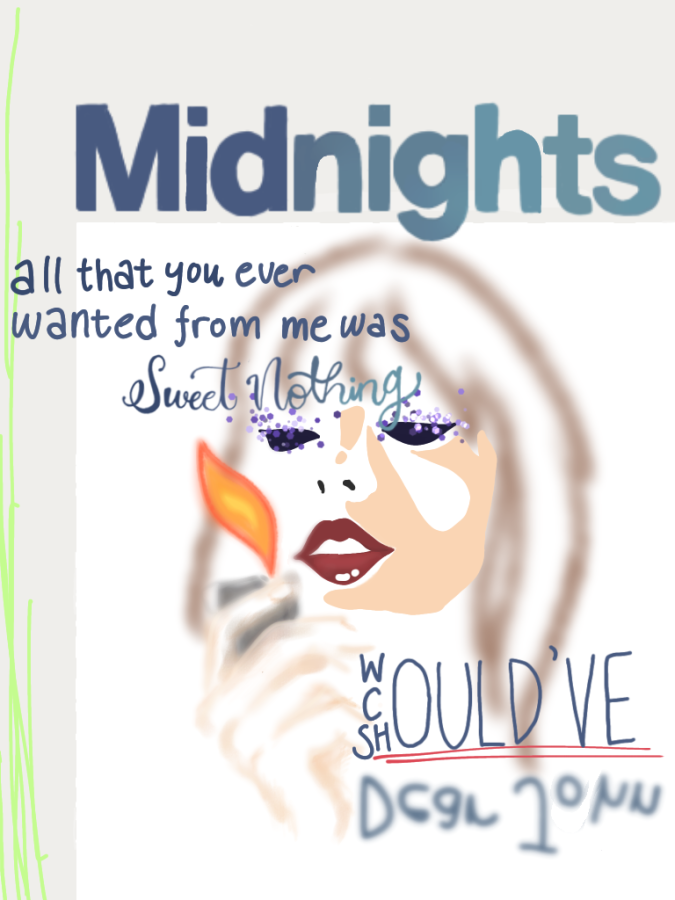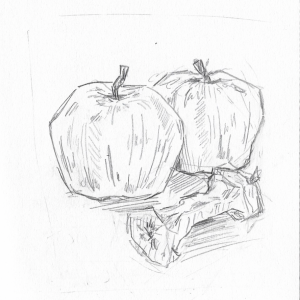Taylor Swift’s Midnights Provides Closure
4.5/5 Falcons
December 6, 2022
At midnight on October 21, 2022, Taylor Swift released her tenth album, Midnights, including Midnights (3am Edition) with seven additional songs. Within its first two weeks, Midnights made Taylor Swift the first person ever to hold all top ten slots of Billboard’s Hot 100 songs. In the first week alone, the album sold 1.6 million copies, the most copies of an album sold since Adele’s 2015 album, 25. Swift’s history of producing incredible songs with complex lyricism and relatable themes continued with this album, and although every song may not be your favorite, each song could be analyzed by poets and English teachers alike to reveal its intricacies. However, this album differs from previous releases; each Midnights and Midnights (3am Edition) track has one or more corresponding songs from Swift’s previous discography.
The second track, “Maroon,” compares best with the titular song “Red” from Swift’s fourth album. This song includes a lyrical framework similar to that of “King of My Heart” from Swift’s sixth album, Reputation, and color-comparisons similar to “Daylight” of Swift’s seventh, Lover. However, this speaks more to Swift’s style than the intentions of the song. Maroon describes a relationship that begins with wonder and ends with toxicity. Both “Maroon” and “Red” use color symbolism to portray emotions and experiences. Maroon being a darker shade of red is a metaphor for “Maroon” being a more adult version of the song “Red”. The development between the writing of “Red” and “Maroon” communicates the idea that at the moment, toxic relationships can be seen as passionate and “burning red”, but upon reflection in a later stage of life, those “romantic” memories are revealed to be darker than they seemed. This is emphasized by “Maroon”’s lyrics: “and I wake with your memory over me/that’s a real f—ing legacy to leave” in contrast with “Red”’s: “but moving on from him is impossible when I see it all in my head”.
The twelfth track, “Sweet Nothings”, is a direct response to “peace” in Swift’s eighth album, evermore. In “peace,” Swift sings: “would it be enough if I could never bring you peace?,” communicating her fear that her status and personality are too much for her partner, Joe Alwyn. This question is directly answered in “Sweet Nothing” which is co-written by none other than Alwyn himself. In it, Swift sings: “all that you ever wanted from me was sweet nothing,” the perfect response to the question asked in “peace”. “Sweet Nothing” is an easy song to fall for due to its soothing and dreamlike nature. It emphasizes the idea that the love that we deserve is out there, and that the small things you do will be enough for someone who really loves you. No line encompasses this quite like: “on the way home/I wrote a poem/you say what a mind/this happens all the time”. Swift notes Alwyn’s appreciation of her lyrical and poetic talents is especially wholesome when compared to “I Bet You Think About Me” from the re-release of Swift’s fourth album, Red. “In I Bet You Think About Me” (Taylor’s Version), Swift sings: “you laughed at my dreams/rolled your eyes at my jokes” in reference to a partner that did not appreciate Swift the way Alwyn evidently does.
Finally, track five, “You’re On Your Own, Kid”. This song includes comparisons to songs such as “Getaway Car” from Reputation, “Lover” from Lover, and others. However, it is the song’s bridge referencing Swift’s eras that catch a listener’s ear. The beginning of the bridge, “from sprinkler splashes and fireplace ashes”, is youthful and correlates to how young and free Swift was during her first two albums, Taylor Swift and Fearless. Next is “I gave my blood/sweat, and tears for this”, which fits Speak Now and Red, both of which are albums that contain painful songs such as “Dear John” from Speak Now and “All Too Well” from Red. This is followed by a reference to Swift’s first pop album, 1989: “I hosted parties/and starved my body/like I’d be saved/by a perfect kiss”. 1989 is full of upbeat, seemingly positive, and romantic songs that fit the idea of partying, yet feeling inadequate and in need of help. After this line is: “the jokes weren’t funny/I took the money/my friends from home don’t know what to say”, which correlates with Reputation, an album that contains harder, more rebellious songs that were quite controversial following the peak of her feud with Kanye West. “I looked around/in a blood soaked gown/and I found something they can’t take away” references the album Lover in that it was based on her love for her partner. This is followed by folklore and evermore in the lines: “cause there were pages turned in the bridges burned” and the re-releases of her albums Speak Now, Red, and her song “Wildest Dreams” in the line: “everything you lose is a step you take”. Finally, Swift references Midnights in the line: “so make the friendship bracelets/seize the moment and taste it/you have no reason to be afraid”. This summary of Swift’s life also introduces the opportunity for a tour such as her announced The Eras tour which is promised to include music from all of Swift’s albums.
With its direct responses to previous songs in the discography and the promise of a tour that says goodbye to all of Swift’s eras, the closure this album provides me alone is unmatched. I cannot imagine how Swift feels knowing her grievances and insecurities were answered. One of the reasons Midnights did not receive a full score of five was the song, “Snow on the Beach”. I loved it, but when a song features Lana Del Rey, it leaves the impression on listeners that it will actually feature Lana Del Rey. This was one of the only things about Midnights that really disappointed me.
A shortened version of this article also appears in our November 2022 print edition.









